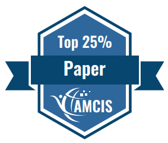SIG Green - Green IS and Sustainability
Loading...
Paper Type
ERF
Paper Number
1373
Description
Multi-criteria decision-making methods have proven their suitability in complex problems of sustainability assessment in different domains. Their main advantage is the capability to simultaneously consider multiple criteria of various dimensions with contrasting objectives. However, these methods assess the current situation at a given moment, whereas sustainability assessment requires considering dynamic changes over time. Thus, the authors of this paper propose a framework based on the Temporal SWARA-SPOTIS method for the temporal evaluation of sustainable development, considering the dynamics of results in long-term observation. The proposed method aggregates the results of the assessments obtained in the different periods, including expert prioritization of the different periods. The practical application of the proposed method involves assessing the sustainability of European countries toward a clean, efficient and affordable energy system.
Recommended Citation
Bączkiewicz, Aleksandra; Wątróbski, Jarosław; and Karczmarczyk, Artur, "Towards Multi-Criteria Temporal Sustainability Assessment" (2022). AMCIS 2022 Proceedings. 6.
https://aisel.aisnet.org/amcis2022/sig_green/sig_green/6
Towards Multi-Criteria Temporal Sustainability Assessment
Multi-criteria decision-making methods have proven their suitability in complex problems of sustainability assessment in different domains. Their main advantage is the capability to simultaneously consider multiple criteria of various dimensions with contrasting objectives. However, these methods assess the current situation at a given moment, whereas sustainability assessment requires considering dynamic changes over time. Thus, the authors of this paper propose a framework based on the Temporal SWARA-SPOTIS method for the temporal evaluation of sustainable development, considering the dynamics of results in long-term observation. The proposed method aggregates the results of the assessments obtained in the different periods, including expert prioritization of the different periods. The practical application of the proposed method involves assessing the sustainability of European countries toward a clean, efficient and affordable energy system.
When commenting on articles, please be friendly, welcoming, respectful and abide by the AIS eLibrary Discussion Thread Code of Conduct posted here.




Comments
SIG Green